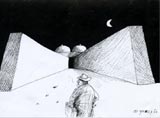'Risk' - Salon at Blacks, November 17, 2002
22 participants
Jeremy Akerman, Enzo Apicella, Oliver Bennett, Pierre Bismuth, Tom Chamberlain, Sacha Craddock, Anthony Fawcett, James Graham, Mark Karasick, Thomas Kilpper, Jonathan King, Guiseppe Mascoli, Deborah Moggach, Paddy O'Connor, Sally O’Reilly, Grayson Perry, Elizabeth Price, James Putnam, Vincenzo Ruggiero, Nicholas Stewart, Penny Thexton, Sylvia Zaranek
Risk is fundamental to human existence in that everything is potentially
at risk, subject to the relentless laws of chance that can create a hostile
external environment. Risk represents the ratio between hostile and successful
outcome. Is a given risk worth the potential reward of taking it? Where the
ratio of reward is clearly greater than the risk proceed but where the risk
is clearly greater than reward, avoid taking it. However, all too frequently
the ratio between risk and reward are more or less equal, or indeterminable
so we hesitate and our ability to be decisive depends on our personality be
it cautious or impulsive. The 'thrill' of risk appeals to some more than others -
mountain climbing, parachuting, bunjee jumping, illicit or risky sex, stocks
and shares, a friendly card game to Russian roulette, the risk can be money
or life itself. In its extreme, risk is linked to a tendency towards self-destruction.
When we seek objective evidence, however quantified or qualified we describe
this risk as rational or informed. The more entrepreneurial we are the more
willing we are to trade high risks for high rewards. Economists tend to rely
on informed choice and their decision is based on weighing the odds between
calculable and incalculable risk. Judgments, particularly of a financial nature
are arrived at analytically through the application of probability theory yet
others are arrived at intuitively through gut instincts.What we call the human
condition is the psychological weight we bear from being subjected to risk. The
so-called thin veneer of civilization seems to represent risk successfully moderated
through the construction of social institutions and conventions. Our behaviour,
whether learned or inherited, individual or collective, is conditioned by the
self-preservational instinct to reduce our exposure to risk or alleviate the
effects of that exposure.
|
|

'Risk' - by the cartoonist Enzo Apicella, 2002 |